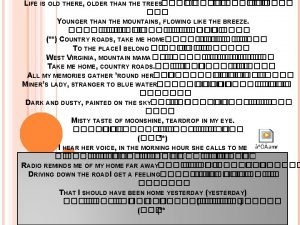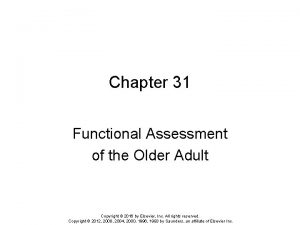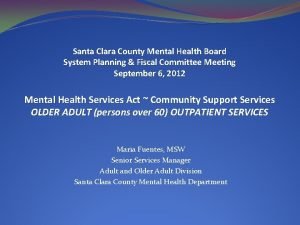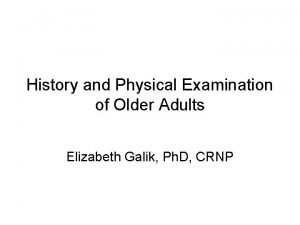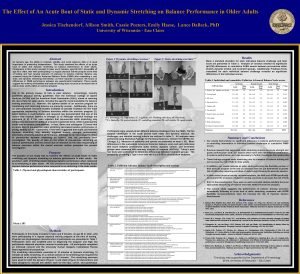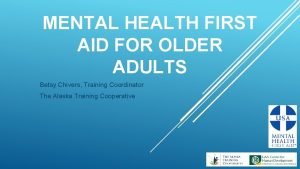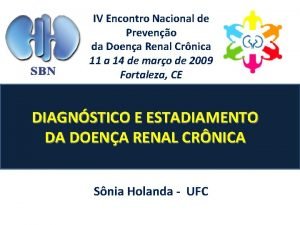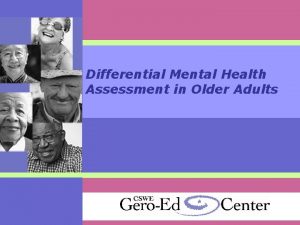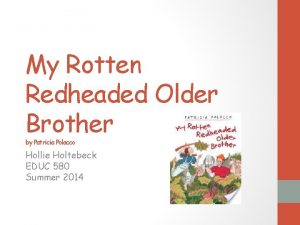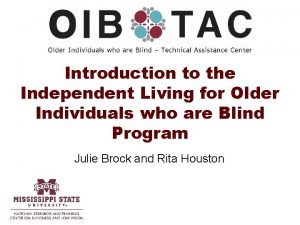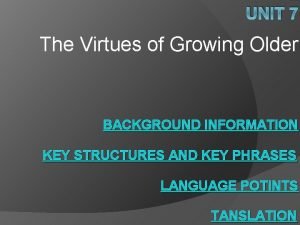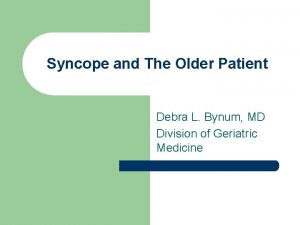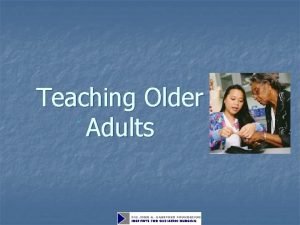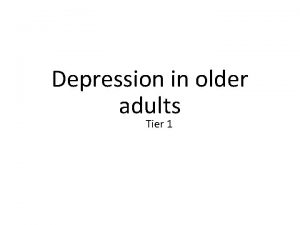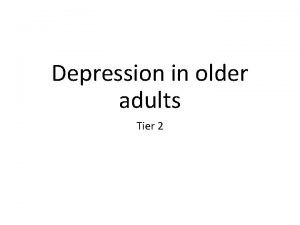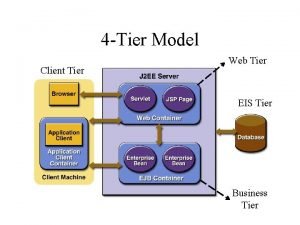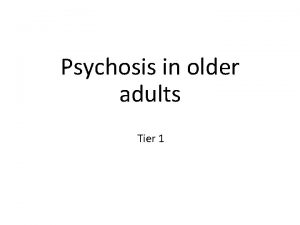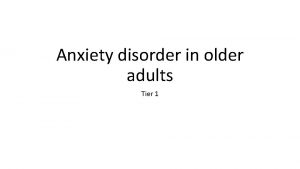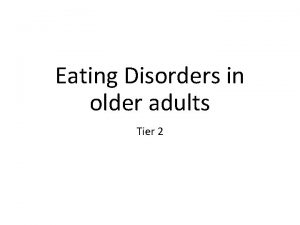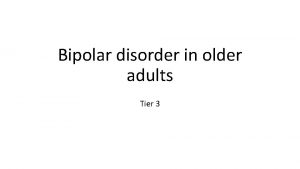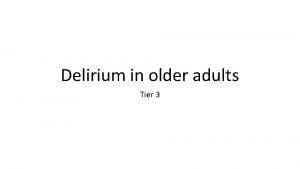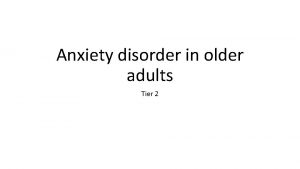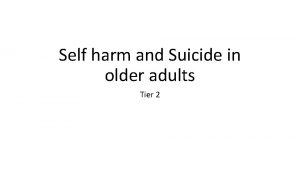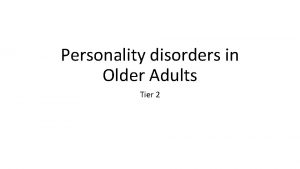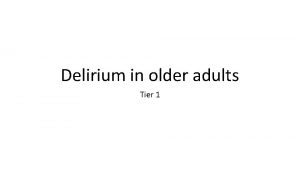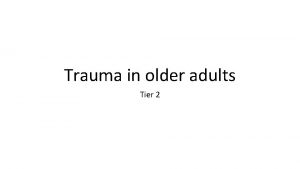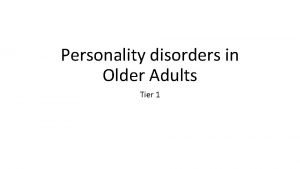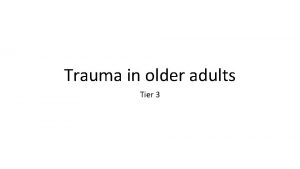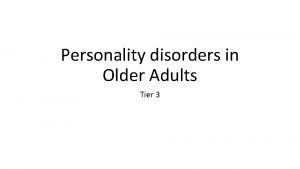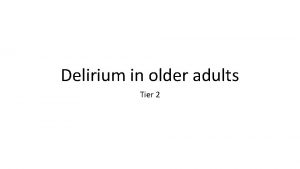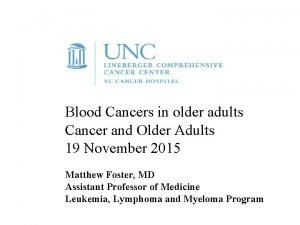Depression in older adults Tier 3 What is






















- Slides: 22

Depression in older adults Tier 3

What is depression? • A syndrome- a group of signs and symptoms that occur together and characterise depression • To confirm a diagnosis: • The symptoms must be on most days for at least two weeks causing significant social or functional impairment • It is NOT a normal experience = NOT inevitable with ageing – hence should not be ignored

Signs and Symptoms of depression �Depressed mood with negative thinking �Disturbed sleep - Early Morning Wakening �Lack of enjoyment and interest �Reduced energy levels and lack of motivation �Slowness of body and mind �Self-esteem and self-confidence are almost always reduced �Ideas of guilt or worthlessness are often present �Reduced appetite and weight loss �Loss of libido �Depressive delusions regarding poverty, physical illness or nihilistic in nature �Thoughts of self harm and suicide

Differences in presentation Older adult may present with different symptoms to younger adult • Anxiety instead of mood • Agitation and restlessness including inability to keep still, constant pacing, irritability • Personality changes • Preoccupation with physical symptoms like faintness or dizziness, pain, weakness, constipation, tiredness. • Unexplained functional decline (walking /incontinence) • Memory problems ( memory impairment-selfreported) • Minimisation or denial that they have depression

Prevalence of depression in older adults • Prevalence in community 3 -15%. • GP surgeries 15 -20%. • Care home residents 15 -20%. • General / acute hospital 20% - could be as high as 40%. • More common in women than men

Depression and Suicide • Older adults tend to have higher rates of completed suicide. • About 1 in 4 older adults who attempt to end their lives complete suicide • About 2/3 have depression.

Risk factors for developing Depression in older adults • Physical illness: pain, Parkinson’s, recent MI, strokes, TIAs, cancer • Loss of sight or hearing • Vascular and Lewy Body dementia • Excess alcohol use • Bereavement • Being a carer • Loss of independence/home/ social network • Loneliness • Past history of deprivation / abuse in their youth • Past history of depression • Certain prescription medications

Why is depression missed ? Older person with depression Staff Older adults may not report low mood due to stigma Staff may not consider the diagnosis and recognition is often low Older adults may not be able to express themselves Staff may believe that depression is justified/ normal Depression is expressed via bodily symptoms Staff may feel ill equipped to deal with the distress Older person may feel ashamed of feeling depressed Staff may be worried about drug side-effects Older adults may not use the term depression Staff may believe depression is untreatable

Risks associated with having depression as an older adults include • Increased mortality in older adults with depression especially from cardio vascular causes • Self-neglect • Neglect of other physical illnesses • Possibility of suicide • Risk of increased cognitive impairment • Increased risk of institutionalisation

Assessment • History and clinical picture • Risk assessment around self neglect /self harm/suicidal thoughts • Collateral history • Rule out physical health , medication causes • Two question screening test for depression • Assessment scales could be used… • Becks’ depression inventory • Geriatric Depression Scale • Hospital Anxiety and Depression Scale • Cornell Scale

Simple questions to screen for depression Two-question screening test • During the last month, have you often been bothered by feeling down, depressed or hopeless? • During the last month, have you often been bothered by having little interest or pleasure in doing things? Answering yes to either of these questions is considered a positive test result, warranting further assessment.

GDS – Geriatric Depression Scale Choose the best answer for how you have felt over the past week: • • • • 1. Are you basically satisfied with your life? 2. Have you dropped many of your activities and interests? 3. Do you feel that your life is empty? 4. Do you often get bored? 5. Are you in good spirits most of the time? 6. Are you afraid that something bad is going to happen to you? 7. Do you feel happy most of the time? 8. Do you often feel helpless? 9. Do you prefer to stay at home, rather than going out and doing new things? 10. Do you feel you have more problems with memory than most? 11. Do you think it is wonderful to be alive now? 12. Do you feel pretty worthless the way you are now? 13. Do you feel full of energy? 14. Do you feel that your situation is hopeless? 15. Do you think that most people are better off than you are? YES / NO YES / NO YES / NO YES / NO Answers in bold indicate depression. Score 1 point for each bolded answer. A score > 5 points is suggestive of depression and warrants follow-up comprehensive assessment. A score > 10 points is almost always indicative of depression. 1/10/2022 12


Management • Investigate and treat any biological factors such as some particular illnesses or medication issues • Reduce any psychological factors such as difficulties with relationships • Reduce any social factors, such as isolation and lack of stimulation • Psychological therapies are effective so consider referral to IAPT • Medications can also help • Refer to Old Age Psychiatry if moderate to severe depression with no response to treatment

How do antidepressants work

Medications Antidepressants: • Selective Serotonin Reuptake Inhibitors (SSRIs) (most commonly used) • Serotonin and Noradrenaline Reuptake Inhibitors (SNRIs) • Tricyclics • Monoamine Oxidase Inhibitors (MAOI) • Remember antidepressants can be effective but also carry higher risk of side effects because of multiple medical comorbidities and drug-drug interactions in cases of polypharmacy. • Mood stabilisers such as Lithium

Common side effects of SSRIs • Headache • Feeling agitated, shaky or anxious • Dizziness • Blurred vision • Gastro intestinal disturbances especially indigestion • Insomnia / drowsiness / abnormal dreams • Sexual dysfunction Also in older adults increase risk of falls and low Sodium NB Serotonin syndrome

Therapies • Psychological therapy such as Supportive psychotherapy, Cognitive behavioural Therapy (CBT) , Interpersonal therapy • ECT may be indicated for severe depression • Treating depression is worthwhile • Treatment response is usually good like younger adults

Course and Prognosis �Average length of depressive disorder 6 months but 25% have episodes of more than one year. � 10 -20% develop chronic depression. � 80% of patients with major depression will experience further episodes. �On average people with major depression will experience 5 further episodes. �One third of depressed patients do not complete remission between episodes.

Preventing depression • Address any physical health issues early • Identify sensory impairments and manage • Life story reviews - find time to sit and chat • Listen & share-Give genuine time, take an interest • Build therapeutic relationships • Encourage activities which are enjoyable • Encourage exercise if possible • Identify depressive symptoms early

Key points to increase detection of depression • Think Depression-If you are aware of depression you will be less likely to miss it • Be aware of risk factors • Look for functional decline • Watch for significant symptoms • Ask directly about their mood Resources : Depression in Older People-animated video https: //www. youtube. com/watch? v=mrqga. Ln. Q 5 z. Q

Resources Depression in Older People-animated video https: //www. youtube. com/watch? v=mrqga. Ln. Q 5 z. Q • MPC_05_06 Where There’s Depression, There’s Hope | Where There’s Depression, There’s Hope (mindedforfamilies. org. uk) • This is an easy to access website for older adults and their families which has good advice about symptoms and treatment of depression in older adults
 3 tier vocabulary
3 tier vocabulary Tiers of vocabulary words
Tiers of vocabulary words Life is older older than the trees
Life is older older than the trees Altered cognition in older adults is commonly attributed to
Altered cognition in older adults is commonly attributed to Older adults mental health
Older adults mental health Shingles older adults
Shingles older adults Dynamic stretching for older adults
Dynamic stretching for older adults Mental health and older adults
Mental health and older adults Renal
Renal Mental health and older adults
Mental health and older adults Covids older adults
Covids older adults Shorter and older taller and younger
Shorter and older taller and younger Poem on growing older
Poem on growing older My rotten redheaded older brother read aloud
My rotten redheaded older brother read aloud Older individuals who are blind program
Older individuals who are blind program Older women's cohousing
Older women's cohousing Hoa/receive/letter/her friend nien/today
Hoa/receive/letter/her friend nien/today The virtues of growing older
The virtues of growing older Bartosz older owl
Bartosz older owl Syncope in the older patient is
Syncope in the older patient is Label
Label Ajayan is ten years older than vijayan
Ajayan is ten years older than vijayan As people grow older
As people grow older


